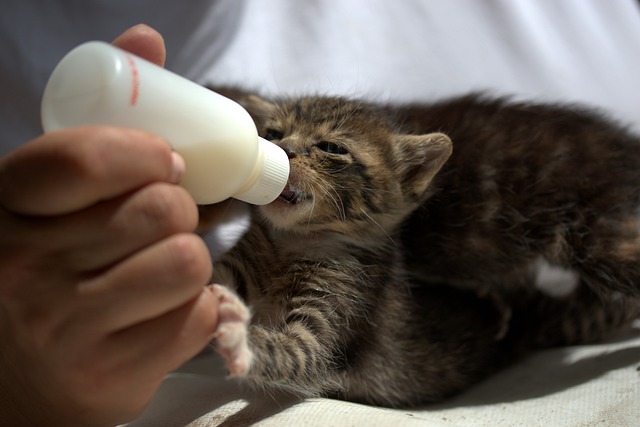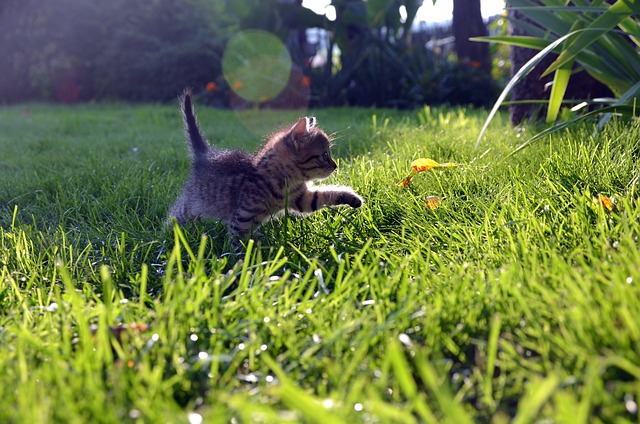When you first bring an orphaned kitten or cat home, it can be an adjustment for both of you. This article is the first in a series about how to help your new feline companion adjust to life as your pet.
An orphaned kitten is a challenging situation for any rescuer. You are their only source of food and care, which means you can’t simply leave them for a few hours or go on vacation. But with patience and perseverance, you will soon have your little orphan fending for herself.
Keeping your orphaned kittens happy, healthy, and well-fed can be challenging. These little guys depend on you for everything—including their very lives.
A scared kitten might hide from you, become aggressive and bite when approached, or remain unresponsive to any efforts to help them. Fortunately, with time and patience, orphaned kittens become more trusting and responsive and return to being friendly little buddies once again. This process just takes time and patience.
The key is to take things slowly, one step at a time. This article breaks the process of taming an orphaned kitten into three phases. The first stage is known as the “Pacification Phase”, which means to make the kitten feel comfortable around you so that you can begin socialization training. This phase takes about two weeks on average with each day revealing more trust from the kitten. If your orphaned kitten struggles with any of these techniques, return to them again once they’re older and their confidence has grown even stronger.
The good news is that most kittens adapt easily once they get used to their new surroundings and start feeling more comfortable with you as their caregiver. If you want to give your new kitten the best chance at thriving in your home, read on for helpful tips about how to get them off on the right foot.
Introduction to Orphaned Kitten Care
When kittens are just a few days old, they rely solely on their mother for warmth, and nourishment, and to keep them safe. Once the mother cat has delivered her new litter, she will begin nursing them and cleaning them with her tongue. She will also protect them from anything that could pose a danger, such as other pets or predators. When the kittens are about two weeks old, they’re typically ready to leave the nest and explore the world around them—at least, that’s when they’ll let us know they’re ready. When they’re about three-four weeks old, they’re referred to as “orphaned” kittens because they have lost the protection of their mother and are at risk of dying without human intervention.
Feeding Your Orphaned Kitten

Depending on the age at which your kittens were found, they might be feeding on their mother’s milk or they might be eating regular kitten food. If your kittens are less than two weeks old, they may still be feeding on their mother’s milk. In this case, you’ll want to leave them with their mother as long as possible, but keep an eye on her to make sure she’s not neglecting them. If your kittens are two weeks old or older, they’ll need their own special kitten food. More importantly, they’ll need to be eating a high-calorie formula that contains extra nutrients, vitamins, and minerals. It’s important to select a kitten food that’s specifically formulated to meet the needs of growing, young felines. Look for a brand that includes taurine, a vital nutrient that helps your kitten’s heart and eyes develop properly.
Handling and Bonding with an Orphaned Kitten
When you first bring your kittens home, you’ll need to keep them confined to a small room with a litter box and food and water bowls. It’s important to confine them in this way because they haven’t had a chance to develop their immune systems and may be more susceptible to infection. You may have to keep them confined for a week or two, or even longer, depending on how old they are. You’ll also want to keep them away from other animals until their immunities are fully developed. The first step in taming your kitten is to bond with them. This means to make them feel comfortable around you so that you can begin socialization training.
I Want to learn more about:
-
Various common behavior problems in cats like scratching, excessive vocalization, attention seeking, OCD, separation anxiety, urine marking, inter-cat aggression in multiple cat household, play aggression, redirected aggression, petting induced aggression, fear, spilling water and others
-
Possible reasons behind these behavior issues exhibited by cats
-
And Many More…
What is Pacification and Why is it Important?

Pacify your kitten by letting them know it’s safe and OK to be around you. This can include things like:
– Using a soft and gentle voice
– Keeping your hands relatively still and away from your face.
– Keeping your movements slow and controlled.
– You must Keep your hands and clothes free of strong scents or fragrances.
-It is important to keep a distance between yourself and your kitten.
This helps your kitten feel safe and unafraid around you. It’s important to avoid startling or startling movements and actions. These can trigger a “fight or flight” reaction in felines and cause them to flee.
Important Things to consider when pacifying an orphan kitten.

When it comes to pacifying orphan kittens, there are a few key things to keep in mind. First and foremost, it’s important to create a safe and secure environment for them. This means providing them with a warm, comfortable place to sleep and plenty of food and water.
Secondly, it’s crucial to socialize them early on. This means spending time with them, handling them gently, and getting them used to being around people. The more socialized they are, the better equipped they’ll be to thrive in a forever home.
Finally, it’s important to give them the individual attention they need. This means taking the time to get to know each kitten’s personality and needs. Some may be more independent than others, while some may need more cuddles and reassurance. By getting to know them as individuals, you can better provide them with the love and care they deserve.
The Taming Process for Orphaned Kittens

The following tips and techniques can help you tame your kitten and make them feel safe and comfortable around you:
– Pet and Stroke Them – Many kittens enjoy being stroked and petted, particularly on their heads and ears.
– Hold Them – After they’ve become comfortable with your presence and stroking, you can try holding them.
– Feed Them – Your kittens may be more comfortable eating if they’re in a calm and relaxed state.
– Carry Them – Once your kittens have become comfortable with you holding them, you can try carrying them while they’re eating or while they’re sleeping.
– Talk to Them – Talking to your kittens in a soft and gentle voice can help them feel comfortable.
– Use Neutral Scents – Wearing scents that aren’t strong or overpowering can help make your kittens feel more comfortable.
Conclusion
Orphaned kittens need your help to survive. If you find kittens who are in need of help and care, don’t panic, get them to a vet as soon as possible. Kittens need warmth and soft surfaces to sleep on. Kittens can be picked up and held, but it is important to be gentle with them. As you care for your kittens, remember that it is important for them to know that you are there for them, but that you will not hurt them. By providing consistent and gentle care, you will help your kittens adjust to their new surroundings and become healthy, happy cats.



